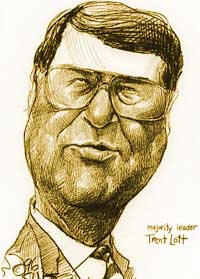|
|
William Pfaff
 America's 'strategy of tension' in Italy
America's 'strategy of tension' in Italy
PARIS -- In February the CIA, after 36 years, reluctantly released the report of its inspector general's inquiry into the Bay of Bigs fiasco, in which nearly 1,500 Cuban opponents of Fidel Castro were killed during a CIA-sponsored invasion which the CIA leadership no longer believed could succeed.
This account of incompetence, bureaucratic obscurantism, and the triumph of "commitment" over common sense, has proven no obstacle to the Senate Republican majority leadership's decision last week to try to force the Clinton administration into new clandestine programs to overthrow Saddam Hussein.
Trent Lott, of Mississippi, the majority leader,
 and other Republican senators,
have amended the State Department authorization bill so as to promote still
another "secret" campaign against the Iraqi leader.
and other Republican senators,
have amended the State Department authorization bill so as to promote still
another "secret" campaign against the Iraqi leader.
Faith in clandestine action survives in Washington despite a record of failures (or successes with deplorable consequences, as in Guatemala and Cambodia) which goes back even beyond the Bay of Pigs, and includes certain morally disastrous episodes only now being revealed.
American responsibility in certain acts of terrorism in Italy in the 1960s and 1970s, meant to overturn Italian democracy, has been under examination by Italian justice. Little has so far been reported about this in the United States. However it deserves attention as not only a secret operation which failed, with bad consequences for everyone involved, but because of what it represented in terms of American political morality.
In December 1969 the Banca dell'Agricoltura in Milan's Piazza Fontana was blown up by a terrorist bomb. Sixteen people were killed and many others were injured. It was the first in a series of anonymous terrorist acts in Italy, apparently committed by right-wing extremists.
These outrages anticipated the terrorism of the left which began not long after. Together, they provided the political drama of the 1970s in Italy -- its "years of lead," during which right and left effectively cooperated in trying to destroy Italian democracy. What has not been known until now is that the United States had a part in that effort.
In 1968 the Italian Communist Party had done exceptionally well in the Italian general elections, and young people in Italy, as in France and the United States, were in an uproar about the Vietnam War. East-West tensions were high because of the Warsaw Pact invasion of Czechoslovakia to put down the peaceful uprising there that had claimed to represent "socialism with a human face."
At the same time, certain leaders of the Christian Democratic Party in Italy, including former prime minister Aldo Moro (later murdered by leftist terrorists), were contemplating a political "opening to the left" that would allow the Communist Party, Italy's second largest, a greater role in the country's affairs.
According to the investigations of the Milan magistrate charged with investigating the Banca dell'Agricoltura bombing, that act and the terrorist outrages which followed were meant to provoke a military coup d'etat in Rome to prevent that move to the left. His evidence indicates that American intelligence officers supported, if they did not instigate, those bombings.
The magistrate, Guido Salvini, says that "the Americans knew in advance about this and other bombings of the period, and they actively supported a strategy of tension designed to destabilize the state and create the conditions for a military coup." (Nineteen months earlier, in April 1967, a military coup had taken place in Greece, enjoying American acquiescence and tacit approval.)
Italian state television has also investigated the 1969 Milan bombing, and has broadcast a two-part documentary report of its findings. In the programs, former CIA officials as well as survivors of the neo-fascist Italian political groups implicated in the Milan bombing, discuss the campaign and acknowledge American involvement.
These two programs were re-broadcast last month on the Franco-German television channel Arte, which is part of the public broadcasting system in France and is a public-sponsored cable channel in Germany and Belgium. The charges have had wide circulation in the West European press as well as television, but have not, so far as I know, had a comprehensive official response from the U.S. government.
It would appear from the television journalists' investigation that U.S. military intelligence, probably Naval Intelligence (the U.S. military command in Italy is Naval), was responsible for the American involvement in the affair.
Given the bureaucratic rivalry and non-communication between the CIA and military agencies, that seems plausible, even though it would constitute an extraordinary intrusion by military intelligence into political matters outside its competence. Mr. Salvini has said simply that "foreign citizens" may be among those indicted.
There was, of course, no coup d'etat. The Christian Democratic prime minister, Mario Rumor, defied those in his party who wanted a coup, and President Giuseppe Saragat threatened to resign rather than preside over "the liquidation of democracy" in Italy.
The "strategy of tension" merely killed or mutilated a number of ordinary
Italians. Its actual political effect was to reinforce the left, including the
emerging terrorist left -- equally hostile to democracy. It is a story worth much
more American attention, and reflection, than it has so far been
3/13/98: Slobodan Milosevic may have started something that can't be stopped